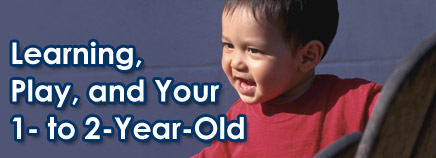
What Your Toddler Is Learning
Kids transition from babies to toddlers during the second year of life, as tentative first steps give way to confident walking. As your toddler starts exploring, be sure to childproof your home to prevent household accidents.
Language. Kids this age also make major strides in understanding language and figuring out how to communicate. At 12 months, most say their first word and start to use hand gestures and point to things. Gradually, their vocabulary will grow from one or two words to 50 words or more.
Your child will learn about language through interaction with you and other caregivers. During year two, a toddler’s vocabulary increases slowly over the first 6 months and then expands quickly during the second 6 months, when many start to use simple two-word sentences. By the second birthday, you’ll probably lose count of the number of words your toddler can say!
Understanding of language also improves — most toddlers understand much more than they can express.
Playing. Hand-eye coordination and manual dexterity will also improve. Toddlers gain better control over fingers and hands and can explore toys and surroundings more than before. Look for toys that encourage this, as mastering age-appropriate toys and games gives toddlers a sense of satisfaction and encourages them to move on to more challenging tasks.
How kids play also changes. As an infant, your child may have “played” with toys by shaking, banging, or throwing them. Your toddler now is aware of the function of objects, so is more likely to stack blocks, listen or talk into a toy phone, or push a toy car. In addition, the concept of pretend play starts. Your little one may pretend to drink from an empty cup, use a banana as a phone, or imagine a block is a car.
Emotions at Play
Play Dates. Many parents introduce play dates now. Toddlers enjoy having other kids around, but don’t expect them to “play” cooperatively with each other or to be thrilled about sharing toys. Have plenty of toys for everyone and be prepared to step in when they don’t want to share. Older siblings can be role models when it comes to teaching, sharing, and taking turns.
Emotions. Tantrums are more common during the toddler years, so expect your child to get frustrated from time to time. If you see a tantrum coming on, try to create a distraction with a book or interesting toy. Avoid letting your child get too tired or hungry, particularly while trying to master new tasks, as this can set the stage for tantrums.
While learning to walk during the second year of life, kids start becoming increasingly independent. But expect your toddler to go from wanting freedom to clinging to you for comfort and reassurance, and back again. Allow the freedom to explore but be there when you’re needed.
If it hasn’t come up yet, your child may develop separation anxiety, crying and clinging to you when you try to leave and resisting attention from others.
The start of separation anxiety — and how long it lasts — varies from child to child. It often starts around 9 months of age, but can be later. It improves as kids master the language and social skills to cope with strange situations and start to learn that the separation is not permanent.
Encouraging Your Toddler to Learn
Once toddlers learn to walk, there’s no turning back. Yours will want to keep moving to build on this newfound skill. Provide lots of chances to be active and to learn and explore in safe surroundings.
Games that your child might enjoy include peekaboo, pat-a-cake, and chasing games. Toddlers love to imitate adults and are fascinated with housework. Provide age-appropriate toys that will encourage this, such as a toy vacuum to use while you’re cleaning or pots, pans, and spoons to play with while you’re cooking.
Other toys that toddlers enjoy include:
- brightly colored balls
- blocks, stacking and nesting toys
- fat crayons or markers
- age-appropriate animal or people figures and dolls
- toy cars and trains
- shape sorters, peg boards
- simple puzzles
- push, pull, and riding toys
Reading continues to be important. Your toddler can follow along with a story and point to objects in the pictures as you name them. Encourage your little one to name things he or she recognizes.
Chat about the books you read together and the things you did that day. Ask questions and encourage your toddler to reply by waiting for a response, then expand on those replies.
Remember that some toddlers develop slower or faster than others, and this variation is normal. Talk with your doctor if you have any concerns.

